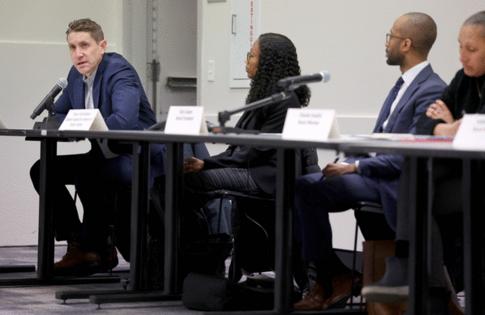Chicago Police Board meets for first time without exiting COPA leader
Published in News & Features
CHICAGO — With little business to act on, the Chicago Police Board gathered Thursday night for its monthly meeting at CPD headquarters, the first since the head of the Civilian Office of Police Accountability announced her plans to step down.
Andrea Kersten, COPA’s chief administrator since 2021, announced her resignation last week amid other high-level city agency departures, including that of COPA’s second-in-command, deputy chief administrator Ephraim Eaddy.
Kersten’s tenure atop the agency, staffed by about 130 others, often drew criticism from law enforcement circles, the union representing CPD officers and pro-police members of the City Council. Those critiques often followed COPA’s release of body-worn camera footage depicting a police shooting, or COPA’s release of a report unflattering to CPD officers.
The impact of Kersten can be seen in data collected by the agency during her tenure.
According to data made publicly available by COPA since May 2021, the month Kersten was named interim chief administrator by former mayor Lori Lightfoot, the agency has opened more than 2,400 investigations based on complaints of police misconduct in the years since.
Since the start of 2021, COPA has called for CPD to suspend 1,074 officers, though the lengths of those proposed suspensions were not known. Meanwhile, the agency has recommended CPD fire 188 CPD officers in the last four years, according to agency data.
Thursday’s gathering largely adhered to usual meeting protocols. But instead of Kersten or Eaddy detailing COPA’s efforts over the last month, the agency’s report was delivered by COPA’s general counsel Ryan Murphy.
“We are incredibly grateful for (Kersten’s) leadership, expertise and unwavering commitment which have significantly shaped COPA’s success,” Murphy told the board and the 30 or so meeting attendees. “COPA has established itself as an independent and transparent voice in Chicago’s community safety system, with many successes, including reaching full compliance with 90% of our consent decree requirements and reductions of our legacy case backlog to historic lows.”
Police Board president Kyle Cooper also thanked Kersten “for her service and her work in the city.”
“She’s been an invaluable resource to me as I started this position on the police board and I just want to pass on my heartfelt good wishes and good luck to her in her next endeavor,” Cooper said.
Cooper also gave a presentation that detailed a steep drop-off in the number of misconduct cases settled by the police board in 2024, and he warned that there will be no clarity on the matter from the state’s highest courts for months, if not years, to come.
Thursday’s meeting was the first since September attended by CPD Superintendent Larry Snelling, who, last year, publicly castigated COPA’s practices and accused agency investigators of leaning on “personal opinions and speculation” to reach case conclusions. Snelling did not address Kersten’s departure during his board presentation.
Last September, a recently fired COPA supervisor filed a whistleblower lawsuit against Kersten and COPA. That former employee, Matthew Haynam, alleged he was let go after he raised concerns of anti-police bias and unprofessionalism within the agency. That suit is still pending in Cook County Circuit Court.
FOP president John Catanzara told the Tribune last week that the Community Commission for Public Safety and Accountability — the city’s newest public safety oversight body that has say over the leaders of COPA, CPD and the police board — was set to hold a no-confidence vote in Kersten to trigger her ouster by the City Council.
The adjudication proceedings for most serious cases of alleged police misconduct were largely stalled in 2024 by a still-pending lawsuit between the city and FOP that centers around an accused officer’s arbitration rights. In the meantime, a police board case can proceed only with an accused officer’s consent. But still, COPA’s investigations have carried on.
At the conclusion of an investigation, COPA will submit its findings and recommendations to the superintendent of CPD. For cases to reach the police board, the penalty sought by CPD must be at least a six-month suspension.
Despite a slowdown of misconduct case closures, the agency has continued to make available body-worn camera footage of police encounters and final summary reports that detail COPA investigators’ findings and recommendations.
Last November, Kersten was among the city leaders to present their agency’s goals for 2025.
As of that month, Kersten previously said, COPA had fully staffed its policy research and analysis division, allowing the agency to supplement “the qualitative approaches that we already have to (identify) those patterns and practices with more quantitative approaches.”
“This work, I believe, can be very prospective in nature and be some of the most transformative efforts that our agency will be able to engage in,” Kersten said.
____
©2025 Chicago Tribune. Visit at chicagotribune.com. Distributed by Tribune Content Agency, LLC.







Comments